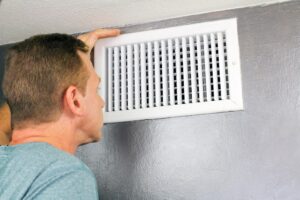Anyone who’s lived through a summer in Allentown, PA can tell you that humidity is an ever-present issue. But what many of those people don’t realize is that humidity isn’t just an outdoor problem. It also has a direct effect on air conditioner performance — here’s how.
ACs Work Harder in High Humidity
Humid air makes it harder for our bodies to cool down, so when your indoor air is too humid, you’ll feel like it’s warmer inside than it is. That’s why air conditioners remove both heat and humidity from indoor air as they work.
But high outdoor humidity levels force your air conditioner to work harder, potentially to the point where it’s no longer capable of cooling your home. When that’s happening, you will begin to notice a variety of symptoms inside your home, including:
- Musty odors
- Condensation on windows and other surfaces
- Discoloration or spotting on wood surfaces
- Clammy skin and heavy, warm feeling air
Humidity Affects AC Sizing
Humidity is a big factor that helps determine the proper sizing of a home’s AC unit, and you must consider it at the time of your air conditioner installation. If the system’s too small, it won’t be able to effectively cool the home. But if it’s too large, it won’t keep indoor moisture at acceptable levels, and the home’s occupants will still feel hotter than they should.
A Dehumidifier Could Be Necessary
There are some situations where the ambient humidity inside a home is so high that an air conditioner alone cannot control it. In those instances, it may be necessary to add a dehumidifier to the system to help it cope with the high humidity levels of the indoor air. Without one, it would be impossible for the AC to maintain a comfortable environment for the home’s occupants.
If you believe that your AC isn’t removing enough humidity from the air in your Allentown, PA home, contact Sullivan Oil and Propane today for air conditioner service. Our expert technicians will get to the root of the problem and recommend the right solution for your home.
Image provided by iStock



